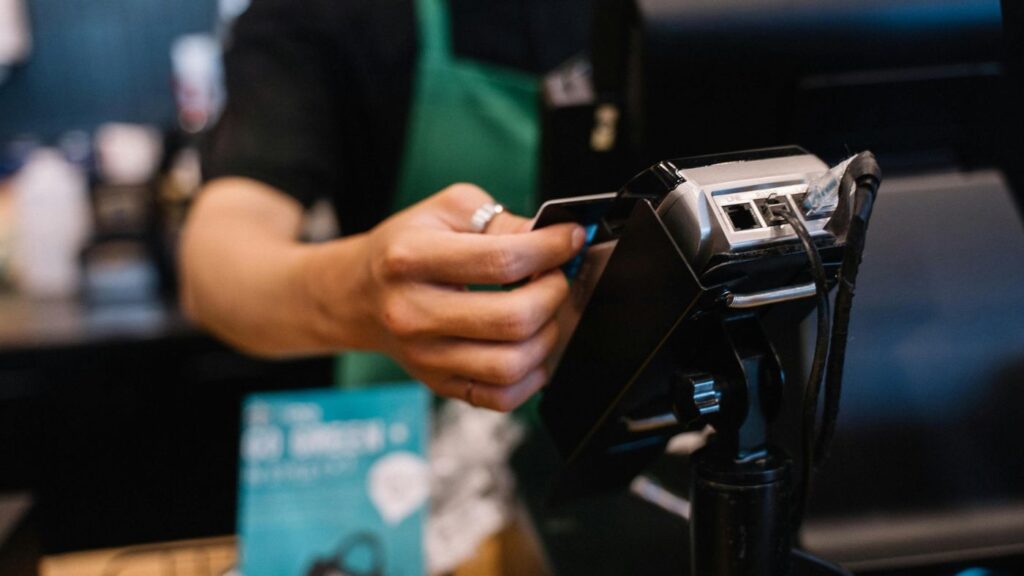Estimated reading time: 1 minute
Table of contents
- Introduction
- The Core Distinction: POS vs. Seed-to-Sale Tracking
- The Non-Negotiable Integration: The Two-Way Real-Time API
- Critical Compliance Guardrails in the Cannabis POS System
- Building the Future-Proof Technology Stack
- Conclusion
- Cannabis POS System and Seed-To-Sale Tracking FAQs
- Additional Resources
- Free eBooks For Cannabis Business Success
- Latest Articles
Cliff Notes: Seed-to-Sale and POS Essential Technology Stack for Cannabis Dispensary Compliance
Objective: Understand critical technology infrastructure required for operational efficiency and mandatory regulatory compliance. Learn the roles of the state’s track-and-trace system (Seed-to-Sale) and the retailer’s cannabis POS system and the integration necessary to avoid legal and financial penalties
Key Components:
- The cannabis POS system must offer a proven, stable, two-way integration with the state’s seed-to-sale tracking system (e.g., Metrc or BioTrack) for real-time data flow.
- Compliance reporting automation is essential, as the POS handles automatic, near-instantaneous reporting of sales, inventory adjustments, and package finalization to the state system.
- The primary function of the retail software is enforcing cannabis purchase limits (daily limits, product equivalencies) and ensuring mandatory age verification for every customer transaction.
- Effective dispensary inventory management features, such as Mobile Scan-to-Count Audits and Lot/Batch tracking, are necessary to prevent the inventory discrepancies that trigger a compliance audit.
- While Metrc is purely a government-mandated seed-to-sale tracking system, the cannabis POS system is the retailer’s operational tool, managing sales, customer data, and loyalty programs.
- Look for platforms offering high uptime and offline mode functionality; the inability to transact due to a software failure is a major revenue and compliance risk.
- The right software stack must integrate with other essential business tools, including E-commerce platforms (Dutchie, Leafly), accounting software (QuickBooks), and payment processing solutions.
Don’t let compliance errors or fragmented software shut down your operations. Catalyst BC’s technical experts can audit your proposed technology stack and build custom standard operating procedures that maximize the compliant use of your cannabis POS system and seed-to-sale tracking.

Introduction
The choice of a cannabis POS system is the most crucial operational decision for a licensed retailer, as this platform must provide robust dispensary inventory management while maintaining perfect, automated compliance with the state-mandated seed-to-sale tracking system. The right technology stack prevents regulatory violations by enforcing cannabis purchase limits and powering seamless compliance reporting automation for every single transaction.
In the tightly regulated cannabis industry, technology isn’t just a business tool—it is the primary means of ensuring regulatory adherence. For a dispensary, the entire operation hinges on the seamless, real-time communication between two core systems: the state’s track-and-trace platform and the retailer’s Point-of-Sale (POS) software. Failing to integrate these systems correctly is the single fastest way to incur fines, legal action, or even license revocation.
The Core Distinction: POS vs. Seed-to-Sale Tracking
To select the right technology stack, a licensee must first understand the fundamental difference between the two mandated systems. Confusing their roles is a common pitfall for new operators.
Seed-to-Sale Tracking (Metrc or BioTrack)
This is the government’s compliance software. It is a mandatory, state-run platform (most commonly Metrc) responsible for tracking every cannabis plant and product from its initial seed or clone state through cultivation, processing, testing, and final sale. The state system is a ledger designed purely for traceability and oversight.
- Primary Role: Regulatory oversight and preventing product diversion to the illicit market. It answers the question, “Where is the cannabis inventory right now?”
- Retail Use: Receiving wholesale manifests from cultivators/processors, assigning State Package IDs to inventory, and recording mandatory adjustments (loss, waste, disposal, or administrative holds).
- Key Feature: The source of truth for all legally compliant cannabis inventory in the state. Operators can only interact with it for compliance—it does not handle sales, discounts, loyalty, or cash management.
Cannabis POS System (Dispensary Point-of-Sale)
This is the retailer’s operational software. It manages the day-to-day business functions, including sales transactions, customer management, loyalty programs, and financial reporting. It is the platform your budtenders and managers will interact with 99% of the time.
- Primary Role: Managing the customer experience, running the cash register, handling discounts, managing labor, and creating sales data.
- Retail Use: Ringing up sales, processing payments, managing customer queues, calculating taxes, and, most critically, serving as the automated conduit for reporting final sales to the state’s system.
- Key Feature: The platform that enforces compliance at the point of transaction and provides the operational intelligence for the business.
The Non-Negotiable Integration: The Two-Way Real-Time API
The compliance burden for a dispensary is the requirement for the cannabis POS system to maintain a perfect, real-time two-way API integration with the state’s seed-to-sale tracking platform. This integration is the lifeblood of a compliant dispensary.
Why Integration Must Be Two-Way:
- Pulling Inventory Data (State to POS): Before an item can be sold, the POS must first verify and pull the official, state-mandated Package IDs (Metrc tags) and product weights/potencies from the Seed-to-Sale system. This ensures the product on the shelf is the exact, legal product the state is tracking. If the state system doesn’t acknowledge the package exists, the POS cannot sell it.
- Pushing Sales Data (POS to State): Upon transaction completion, the POS must automatically and instantly push the sales data (specifically, which Metrc package ID was sold and how much) back to the state platform. This process, often called Compliance Reporting Automation, immediately marks the item as sold and removes it from the state’s track-and-trace inventory. This instantaneous reporting prevents product diversion and is required in nearly all legal markets.
- Audit-Ready Reconciliation: A robust integration constantly monitors for data sync failures and provides real-time Inventory Reconciliation Software to help managers instantly spot and correct any discrepancies between the physical count, the POS record, and the state’s tracking system. Manual data entry (e.g., exporting a CSV and uploading it to Metrc) is a recipe for error and a liability risk that should be avoided at all costs.
Critical Compliance Guardrails in the Cannabis POS System
The primary value of a cannabis-specific POS is its ability to enforce compliance before a violation occurs, moving beyond simple inventory reporting to act as an automated regulatory gatekeeper.
Automated Cannabis Purchase Limits Enforcement
This is the most frequent point of failure in compliance. State regulations dictate strict Daily Customer Limits on the amount of cannabis (based on product equivalencies, e.g., 1 ounce of flower=8 grams of concentrate=800 mg of edibles). These calculations are too complex for a human budtender to manage reliably.
- POS Function: The POS must automatically calculate these complex equivalencies as a budtender adds items to the cart. It uses Compliance Guardrails like a “purchase limit progress bar” that tracks the customer’s remaining allotment in real-time. It can also integrate with the state system to check the customer’s purchase history across all dispensaries in the state to prevent “looping.”
- The Guardrail: If a budtender attempts to finalize a sale that exceeds the customer’s limit, the POS system must instantly block the transaction, displaying the exact reason for the violation, thereby preventing a clear regulatory and criminal violation.
Mandatory Age and ID Verification
The POS system acts as the final gate for legal transactions and must maintain an impeccable Audit Trail.
- POS Function: The best systems integrate ID Scanners and Age Verification Software into the check-in process. The system instantly verifies the ID’s validity and, if the customer is under the legal age, flags or blocks the transaction immediately.
- Audit Trail: The system must record the customer’s Date of Birth, ID Type, and, in medical markets, their Patient Card Number for every single transaction, creating a permanent, audit-ready record of compliance that can be provided to regulators on demand.
High Uptime and Offline Mode
A state-mandated technology stack cannot fail. If the state’s tracking system goes down, or the dispensary loses internet, sales must continue—compliantly.
- POS Function: A premium Compliant Retail POS offers a robust Offline Mode that records all sales locally using a FIFO (First-In, First-Out) logic. This allows transactions to continue without interruption.
- Compliance Protocol: Once connectivity is restored, the system automatically and sequentially pushes the batched sales data to the state platform, fulfilling the requirement that all sales are reported within a narrow, state-defined window (typically 24 hours). Selecting a POS without this feature is a catastrophic business continuity risk.
Building the Future-Proof Technology Stack
For a new or scaling licensee, choosing the right POS is an investment in operational security. The ideal cannabis POS system should not only handle compliance but also facilitate efficient management and business growth.
| Technology Component | Why It Matters for Compliance & Efficiency |
| Open API Ecosystem | Allows seamless integration with essential ancillary tools like E-commerce platforms (Dutchie, Leafly), Accounting Software (QuickBooks), and CRM tools. A closed system limits your ability to scale and diversify sales channels. |
| Mobile Inventory Audits | Enables quick, compliant cycle counting and physical inventory Scan-to-Count Audits using handheld devices. This allows managers to proactively catch and fix inventory discrepancies (the number one cause of compliance failures) before an official audit. |
| Robust Tax Reporting | The system must automatically calculate the complex layers of State Sales Tax, Local Excise Taxes, and often Weight/Potency Taxes, generating reports that are correctly formatted for both the state and the IRS 280E requirements. |
| Role-Based Permissions | Allows managers to control which employees can perform sensitive actions (e.g., inventory adjustments, voids, returns). This creates a critical Audit Trail and reduces internal theft and human-error related compliance risks. |
| Delivery Compliance Tracking | For delivery markets, the POS must generate compliant manifests and track driver routes in real-time, ensuring adherence to strict state-mandated transportation and possession rules. |
Conclusion
Don’t let compliance errors or fragmented software shut down your operations. The synergy between a state-integrated cannabis POS system and the seed-to-sale tracking platform is the foundation of a legal, profitable cannabis retail business. Licensing is only the first step; mastering the technology stack is how you stay in business.
Catalyst BC’s technical experts can audit your proposed technology stack and build custom standard operating procedures that maximize the compliant use of your cannabis POS system and seed-to-sale tracking.
Contact Catalyst BC today to secure your technology foundation and guarantee a smooth, audit-ready operational launch.
Cannabis POS System and Seed-To-Sale Tracking FAQs
The cannabis POS system (Dispensary Point-of-Sale) is the retailer’s operational software for sales, inventory, and customer management. Seed-to-Sale Tracking (like Metrc or BioTrack) is the State Compliance Software that monitors inventory movement across the entire supply chain, and the POS must integrate with it to report final sales.
The cannabis POS system must have built-in Compliance Guardrails that automatically calculate and enforce cannabis purchase limits (Daily Customer Limits) by tracking product equivalencies (e.g., grams of flower vs. milligrams of edibles) and blocking the sale if a customer exceeds the legal limit.
A real-time two-way integration means the cannabis POS system sends sales data instantly to the seed-to-sale tracking system (e.g., automated Metrc submissions) and, critically, pulls back the official State Package IDs and inventory status. This ensures the POS and the state’s system are always perfectly reconciled.
The two primary Seed-to-Sale Tracking systems are Metrc and BioTrack. Metrc is purely a government system and requires a separate, integrated cannabis POS system. BioTrack offers a full inventory traceability platform which can include its own POS, but many businesses still opt for a third-party POS like Flowhub or Cova.
Priorities for dispensary inventory management should include Mobile Barcode Scanning for fast receiving and auditing, Lot/Batch tracking for recalls, and a robust Inventory Reconciliation Software that quickly highlights discrepancies between physical inventory and the state’s reported stock.
The biggest risks are regulatory fines or license suspension due to non-compliance. Common issues include inaccurate compliance reporting automation, failure to enforce cannabis purchase limits, and inventory discrepancies that the state interprets as product diversion.
Yes, a proper cannabis POS system is built to automatically calculate and apply the complex array of taxes in the industry, including state sales tax, local excise taxes, and weight/potency taxes at the point of sale, which is a key part of compliance reporting automation.
You must select a cannabis POS system with a reliable offline Mode. This feature allows the system to continue processing sales, enforcing cannabis purchase limits, and recording customer data locally. Once connectivity is restored, the system automatically uploads all transactions to the seed-to-sale tracking system.
A modern cannabis POS system simplifies tasks like customer loyalty program management, Employee clock-In/out and permissions, integration with E-commerce menus, and the generation of audit-ready reporting for finance and regulatory reviews.
You are mandatory required to use the state’s chosen seed-to-sale tracking system (Metrc, BioTrack, etc.). You may choose a third-party cannabis POS system or ERP, but it must be an approved vendor that can integrate seamlessly with the state’s required seed-to-sale tracking platform.
Additional Resources
Free eBooks For Cannabis Business Success
Latest Articles
- Missouri Cannabis Licensing & Business Opportunities 2026Missouri has established itself as the premier success story for cannabis in the Midwest, evolving from a standard medical regime to a high-volume adult-use market that exceeded $1.52 billion in annual sales in 2025. As the market enters the 2026–2027 biennium, the landscape is shifting from rapid expansion toward operational maturation and specialized entry.
- North Carolina Cannabis Licensing & Business Opportunities 2026North Carolina remains one of the final significant jurisdictions in the United States without a comprehensive medical or adult-use cannabis program. However, the 2026–2027 biennium is projected to be the most consequential period in the state’s cannabis history. Driven by the formation of the North Carolina Advisory Council on Cannabis and an impending federal “hemp cliff,” the state is moving from a period of passive prohibition toward a structured, albeit highly restrictive, regulatory framework.
- Nebraska Cannabis Licensing & Business Opportunities 2026Nebraska is entering the 2026–2027 biennium at a historic crossroads. Following the 71% voter approval of Initiatives 437 and 438 in late 2024—the largest margin for a medical cannabis initiative in U.S. history—the state is currently standing up its first regulated medical infrastructure.
- Florida Cannabis Licensing & Business Opportunities 2026Florida represents the most capital-intensive and professionally structured cannabis market in the nation. As of 2026, the state is at a crossroads: it is both expanding its mature medical program and preparing for a potential constitutional shift toward universal adult-use access. On November 3, 2026, Florida voters will decide on the Marijuana Legalization Initiative (Amendment 3). Passing this requires a 60% supermajority—a high threshold, but one that polls suggest is within reach.
- Virginia Cannabis Licensing & Business Opportunities 2026As Virginia transitions from its current “possession-only” model toward a fully regulated retail market, the 2026–2027 biennium represents a once-in-a-generation window for market entry. Unlike the vertically integrated “medical-only” regimes of the past, Virginia’s upcoming framework focuses on decentralization, specifically architected to favor small Virginia-based operators over large multi-state corporations.
- Minnesota Cannabis Licensing & Business Opportunities 2026Minnesota is currently undergoing a transformative shift in its cannabis landscape, moving from a semi-regulated hemp-derived market toward a fully comprehensive adult-use framework. Overseen by the Office of Cannabis Management (OCM), the 2026–2027 biennium represents the critical “enforcement phase” where temporary registrations sunset and permanent, merit-based licenses define the market’s long-term leaders.











